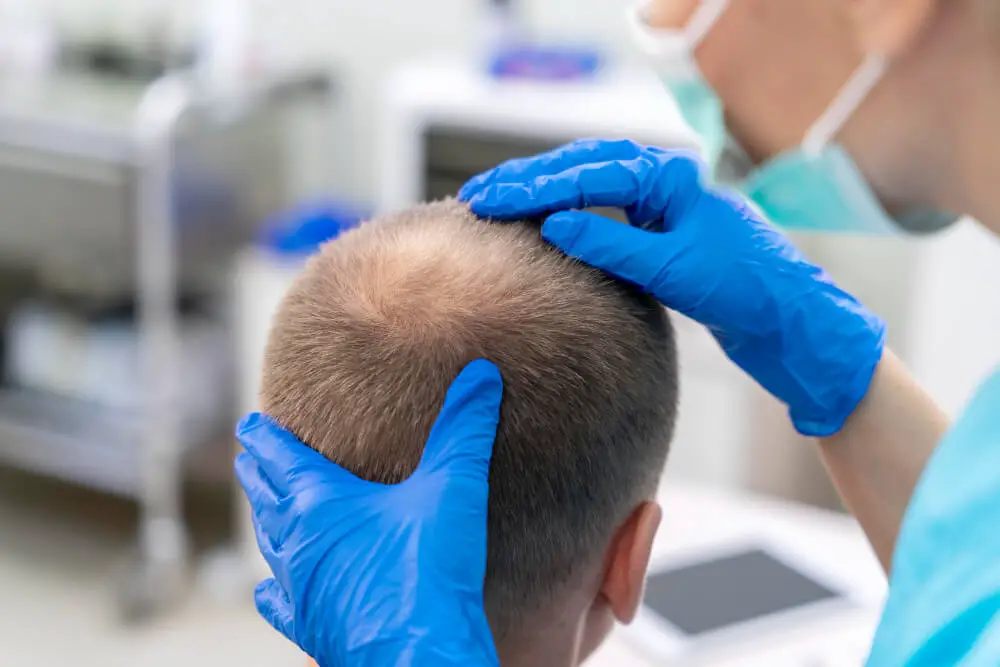Introduction
Hair loss is an inevitable concern for many, with factors ranging from genetics to stress and diet playing their part. But what if I told you there’s a surprising factor that might be causing your hair to thin? Brace yourself, because the culprit we’re unveiling today might not be what you expect: syphilis. Indeed, you’ve read correctly. Syphilis, a sexually transmitted infection with a long history, might be the underlying cause of your swiftly advancing hair loss.
Unmasking the Great Mimicker: Syphilis’s Stealthy Entrance
We’ve all heard about syphilis, but did you know it has a talent for disguise? Aptly named the “great mimicker,” syphilis is notorious for presenting symptoms that can be easily mistaken for other diseases or disorders. And guess what? One of these disguises might just be hair loss. Before you roll your eyes, consider this: seemingly harmless hair loss could be your body’s way of signaling an underlying syphilis infection.
The Dance of Syphilis and Hair Loss: A Complex Partnership
Syphilis and hair loss might seem like an unlikely pair, but the connection is more intricate than meets the eye. Picture this: Your body is a finely tuned orchestra, and syphilis is a mischievous conductor disrupting the harmony. As syphilis progresses through its stages, hair loss can enter the scene as a part of the performance. However, this isn’t a solo act. It’s a complex dance involving different stages of syphilis, from primary to tertiary.
Spotting the Stealthy Culprit: Unmasking Syphilitic Alopecia
So, how does syphilis manage to sneak in and cause hair loss? It’s like a master of disguise, wearing various hats to blend in with other hair loss patterns. Imagine a chameleon flawlessly adapting to its surroundings. Syphilitic alopecia mimics various types of hair loss, from “moth-eaten” patterns to conditions like alopecia areata and trichotillomania. This is where things get tricky: distinguishing syphilitic alopecia from its hair loss look-alikes can be like finding a needle in a haystack.
The Great Escape: Does Hair Loss Fade with Treatment?
The good news is that the hair loss syphilis brings to the party is often just temporary. Research suggests that treating the underlying syphilis infection can lead to the restoration of your luscious locks. But remember, patience is key. Just as syphilis takes its time to manifest, reversing its effects on your hair will also require some waiting. The hair that went MIA due to syphilis may slowly but surely rejoin the party, thanks to proper treatment.
The Secret Weapons: Treating Syphilis Hair Loss with Precision
If you’re concerned about restoring your hair’s former glory post-syphilis, know that you’re not alone. There are treatments out there that can help accelerate the regrowth process. Enter Platelet Rich Plasma (PRP) therapy – a revolutionary treatment making waves in various hair loss scenarios, including syphilitic alopecia. Picture this therapy as a superhero swooping in to repair the damage. By injecting platelets enriched with growth factors directly into your scalp, PRP therapy kickstarts the healing process and rejuvenates damaged follicles.
Syphilis Hair Loss: Not a Solo Act
While our attention has centered on the impact of syphilis on hair loss, it’s imperative to grasp the gravity of this infection. Syphilis poses significant risks if overlooked, potentially leading to severe repercussions. As you anticipate the revival of your hair, remember to prioritize seeking medical care to tackle the root cause of the issue. Your health is the main act, and everything else is just a supporting role.
Conclusion:
In the intricate world of health and well-being, surprises await us at every turn. Who would have thought that a bacterial infection from generations past could be linked to hair loss in the present? Syphilis, the master of disguise, teaches us that vigilance and early intervention are key. So, as you embark on the journey to restore your hair’s vitality, remember to keep an eye on the bigger picture – your overall health and well-being. After all, life’s surprises are best faced head-on, with or without hair.
Disclaimer: The information provided in this article is for informational purposes only and should not be considered as medical advice. Always consult with a qualified healthcare professional before making any decisions regarding your health or treatments. For more information, please read our Medical Disclaimer.
Frequently Asked Questions:
- Can syphilis really cause hair loss?
Indeed, syphilis has the capacity to trigger hair loss. Although it may not be the prevalent symptom, it remains a conceivable outcome of contracting this sexually transmitted infection. The microorganisms accountable for syphilis can exert an influence on hair follicles, potentially leading to the thinning or loss of hair. - Is syphilitic hair loss permanent?
The positive aspect is that hair loss induced by syphilis tends to be temporary in most cases. Following effective treatment and proper management of the infection, the hair follicles have the potential to undergo gradual recovery, resulting in the resurgence and revival of hair density. - How does syphilis affect hair follicles?
Syphilis impacts hair follicles through diverse mechanisms, encompassing inflammation, follicle blockage, and the redirection of hair into phases of rest or shedding. In fact, it can imitate other patterns of hair loss, adding complexity to the diagnostic process. Nonetheless, appropriate treatment can effectively counteract and undo these consequences. - Can syphilis-related hair loss be mistaken for other conditions?
Indeed, syphilitic alopecia, which refers to hair loss stemming from syphilis infection, possesses the ability to resemble other forms of hair loss, such as alopecia areata or trichotillomania. This similarity introduces a challenge in achieving precise diagnosis without the guidance of comprehensive medical assessment. - Is hair loss the only concern with syphilis?
Although hair loss might command our focus, it’s imperative to keep in mind that syphilis extends beyond a mere concern about hair. If not addressed, syphilis can give rise to grave health complications, potentially affecting organs, the nervous system, and even culminating in fatal outcomes. Prioritizing medical intervention becomes pivotal for safeguarding overall well-being.
References:
- Bi MY, Cohen PR, Robinson FW, Gray JM. Alopecia syphilitica-report of a patient with secondary syphilis presenting as moth-eaten alopecia and a review of its common mimickers. Dermatology Online Journal. 2009;15(6).
- Billick MJ, Gold WL. Alopecia in a 36-year-old man with HIV infection. JAMA. 2021;326:435-436.
- Hernández-Bel P, Unamuno B, Sánchez-Carazo JL, Febrer I, Alegre V. Syphilitic alopecia: a report of 5 cases and a review of the literature. Actas Dermosifiliogr. 2013;104:512-517.
- Cao HL, Engle MY, Shen YF, Wang JY. Moth-eaten essential syphilitic alopecia. QJM. 2015;108:157-158.
- Doche I, Hordinsky MK, Valente NYS, Romiti R, Tosti A. Syphilitic alopecia: case reports and trichoscopic findings. Skin Appendage Disorders. 2017;3:222-224.
- Pagliarello C, Cortelazzi C, Feliciani C, Di Nuzzo S. Secondary syphilis. Lancet Infectious Diseases. 2016;16:1304.




